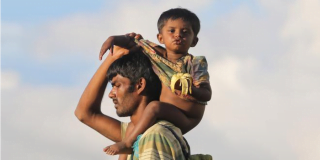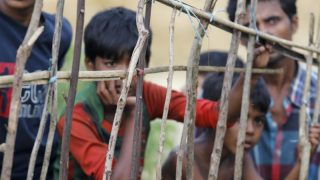Many people find themselves torn over asylum seekers. They want to be compassionate, and for them this includes stopping people from dying at sea. Between 2000 and 2013 it is thought that approximately 1,225 asylum seekers on their way to Australia died at sea. During the same period 24,203 people arrived by boat , meaning just on five percent of those embarking for Australia perish during the journey. The harsh treatment of asylum seekers – sending boat arrivals to Nauru or Manus Island without any hope of ever resettling in Australia – has recently been justified on the ground that this is necessary to deter people from boarding overcrowded, unseaworthy boats and drowning enroute to Australia. Malcolm Turnbull summed it up like this:
Our policy is a harsh one, it really is. All of the policies to deal with asylum seekers and people smuggling are harsh, cruel in fact. But the problem is the status quo is cruel. It is analogous to what people say about the Middle East: there is no shortage of bad options here.You have to work out the least cruel, most effective, most efficient means of depriving the people smuggler of a product to sell.
(Source: http://www.smh.com.au/federal-politics/federal-election-2013/our-asylum-seeker-policy-is-cruel-malcolm-turnbull-20130819-2s7d7.html#ixzz2w0nj1Zk8)
Preventing deaths at sea is indeed a goal we should pursue, but punishing those fleeing persecution is a morally reprehensible way to achieve it, on four grounds.
First, refugees are people who have committed no crime, but are rather, victims of the most terrible crimes. To punish them for doing something permitted by international law is incomprehensibly unjust.
Second, deterrence is effective only when we make life so miserable that a refugee would prefer to remain in a State where they are impoverished and their rights violated, or alternately decide to go somewhere else, which amounts to Australia asking other States to bear a burden we are unwilling to bear ourselves.
Third, the international refugee system depends upon the principle that those fleeing persecution find asylum in any country to which they flee. Should other countries follow Australia’s example, the global refugee system would collapse.
Fourth, the argument that offshore detention is the lesser of two evils – the greater evil being deaths at sea – is valid only in the absence of a better alternative. Refugee advocates, including former Prime Minister Malcolm Fraser, rightly argue that preventing deaths at sea can be reached by just and humane means. At present, refugees and asylum seekers in Indonesia, the main transit country to Australia, experience very difficult conditions, with little hope of resettlement. In 2012, for example, Australia accepted for resettlement only two hundred and thirty three refugees from Indonesia. With such a slim chance of being offered resettlement, is it any surprise people board boats? A report by irin news backs this up:
Refugees and asylum seekers in Indonesia, many of whom fled persecution and conflict in their home countries, say they are being driven to get on boats for Australia out of frustration with the resettlement process.
“It’s been two years that I have been here. How long am I supposed to wait?” asked Liaqat Ali Yousufi, 32, an ethnic Hazara from Afghanistan’s eastern Ghazni Province, who was registered as a refugee in November 2011 and had hoped to be resettled to Australia by now. “The process doesn’t work. There are people waiting three or four years” he said.
“It just doesn’t make sense anymore. Sometimes I think it would just be easier to get on a boat,” Riad Kamil, 50, an Iraqi asylum seeker from Baghdad, whose case is on appeal after he was refused refugee status in 2011. Both men live in community housing in the town of Pucak, a hub for asylum seekers and their families – and the people smugglers ready to assist them – about 80km outside of Jakarta, the Indonesian capital.
Almost all of the residents have been granted refugee status by the UN Refugee Agency (UNHCR), and some are families seeking asylum.
“You can’t blame them. It [refugee determination] is an open-ended process, and that’s the frustration – there are no dates for anything,” said an aid worker who asked not to be named.
(Source: http://www.irinnews.org/report/95714/indonesia-asylum-seekers-take-to-boats-out-of-frustration)
Australia could work with transit countries, such as Malaysia and Indonesia, to establish well resourced centres that allow rapid assessment of refugee claims and access to health and welfare benefits. Coupled with an increase in the numbers Australia resettles from these countries – if we shut the offshore detention centres we could increase the refugee intake by 30,000pa and save close to $1 billion – this would create a viable pathway for refugees, reduce extended waiting periods for resettlement and therefore reduce the incentive to board unseaworthy boats.







Exceptionally well written article Scott. Thank you.
yes – very well written solution to the problem. But it Sounds like something I’ve heard before: the Malaysia Solution